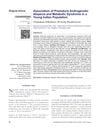13 citations
,
January 2019 in “Indian Journal of Dermatology” Men with early-onset hair loss have more heart disease risk factors.
9 citations
,
January 2018 in “Indian Journal of Endocrinology and Metabolism” Androgenetic alopecia is significantly linked to metabolic syndrome.
5 citations
,
May 2017 in “International Journal of Research in Dermatology” Early onset hair loss in young men is common and linked to family history and alcohol use.
 37 citations
,
February 2017 in “Anais Brasileiros De Dermatologia”
37 citations
,
February 2017 in “Anais Brasileiros De Dermatologia” AGA more common in men, increases with age, linked to family history, hypertension, dyslipidemia, and smoking.
 14 citations
,
March 2016 in “Journal of Dermatology”
14 citations
,
March 2016 in “Journal of Dermatology” Hair loss links to high blood pressure, high fat levels, and metabolic issues, suggesting early heart disease screening.
16 citations
,
January 2016 in “Indian Journal of Dermatology, Venereology and Leprology” Metabolic syndrome is more common in people with early-onset androgenic alopecia.
 24 citations
,
January 2015 in “International Journal of Trichology”
24 citations
,
January 2015 in “International Journal of Trichology” Early balding in young Indian men may indicate a higher risk of metabolic syndrome and potential heart disease.
 34 citations
,
January 2014 in “Indian Dermatology Online Journal”
34 citations
,
January 2014 in “Indian Dermatology Online Journal” Hair loss linked to metabolic issues and insulin resistance; early assessment may reduce future health risks.
 16 citations
,
January 2014 in “International Journal of Trichology”
16 citations
,
January 2014 in “International Journal of Trichology” Early hair loss links to metabolic issues in young Indian men.
7 citations
,
January 2013 in “Egyptian Journal of Dermatology and Venereology” Men with androgenetic alopecia may have higher blood pressure, suggesting early screening for hypertension.
 24 citations
,
January 2013 in “Indian Dermatology Online Journal”
24 citations
,
January 2013 in “Indian Dermatology Online Journal” Balding people may have higher heart disease risk.
 110 citations
,
July 2010 in “Journal of The American Academy of Dermatology”
110 citations
,
July 2010 in “Journal of The American Academy of Dermatology” Hair loss linked to higher heart disease risk in both men and women.
 28 citations
,
March 2007 in “Journal of The European Academy of Dermatology and Venereology”
28 citations
,
March 2007 in “Journal of The European Academy of Dermatology and Venereology” At least 87% of Indian men experience hair loss, with type II being most common and severity increasing with age.
 155 citations
,
December 2003 in “British Journal of Dermatology”
155 citations
,
December 2003 in “British Journal of Dermatology” Hair loss increases with age; alcohol raises risk, more female partners lowers it.
 19 citations
,
August 2000 in “International Journal of Dermatology”
19 citations
,
August 2000 in “International Journal of Dermatology” Minoxidil and finasteride can slow or halt hair loss, but may have side effects.
 179 citations
,
September 1998 in “BMJ”
179 citations
,
September 1998 in “BMJ” Hair loss in men is common, treatable, but not curable.



















